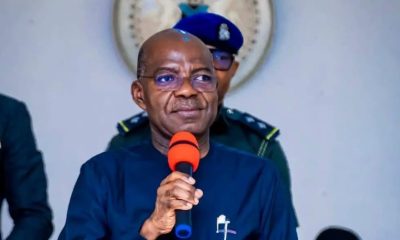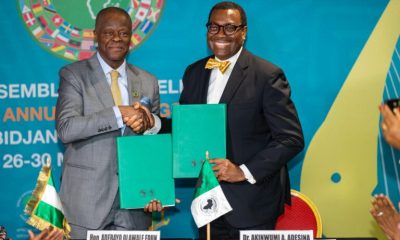Economy
The Promise of a New Revenue Formula

By Salisu Na’inna Dambatta
It is interesting that a new Revenue Sharing Formula by the Revenue Mobilization, Allocation and Fiscal Commission (RMAFC) will be worked out soon to replace the 20-year old existing version.
The Chairman of the Revenue Mobilization Allocation and Fiscal Commission, Mr.
Elias Mbam said that in addition to a new sharing formula, the Commission will “expand the sources of revenue for the Federation. ”“I intend to do this through diversification in areas outside Oil and Gas, and that includes solid minerals, agriculture and manufacturing.”
There is no doubt that the existing renenue allocation formula has been subjected to criticisms by politicians and development experts who believe that the 52.
68 per cent allocated to the Federal Government; the 26.72 per cent to the States and 20.60 per cent for the 744 Local Government Areas in the country is due for retouching.However, it is important to note that in the Nigerian peculiar way of doing things, every Revenue Allocation formula, from the first one introduced in 1948 (on the recommendation of Hicks Philipson Commission of 1946) as part of the Richardson Constitution for the three regions of Nigeria to the extant version, has always been criticised or opposed by people who expressed their various perspectives on how the formulae should have been formulated.
It is to tamper those varied perspectives with reasoning that a framework, based on over a dozen of factors or indices, was developed to accommodate various interests and address divergent concerns and foster national acceptance for it.
The indices in the framework listed by Victor I. Lukpata, Ph.D of the Department of History and Diplomatic Studies, Federal University Wukari, Taraba State, are: Basic needs; Minimum Material Standards; Balanced Development; Derivation;Equality of Access to Development Opportunities;Independent Revenue/Tax effort;Absorptive Capacity and Fiscal Efficiency. Others are Minimum responsibility of Government; Population; Social Development Factor; Equality of States; Landmass and Terrain and finally, Internal Revenue Generation Effort.
The above principles have continued to serve as the yardstick for revenue allocation up to this day.
Each state of the Federation, the 744 Local Government Areas and the Federal Government get a portion from the Federation Account based on these indices. On its part, the Federal Government gets the portion assigned to it because of the huge responsibilies it bears: ensuring national security, caring for the Armed Forces, the Police Force, Foreign Relations, building and maintenance of the most critical roadways, the railways, internal and international maritime services, Customs, Education, Health, Agriculture and National Food Security and the provision of many more money-guzzling public goods nationwide.
In the process of sharing the revenue, the Federal Ministry of Finance chairs the Federation Account Allocation Committee (FAAC) every month. The Secretariat of FAAC is at that Ministry, but the Department of FAAC is domiciled in the Office of the Accountant-General of the Federation (OAGF).
The Commissioners for Finance of the 36 states, a representative of the Federal Capital Territory, Abuja, are members of FAAC, as are revenue-related entities including the RMAFC, the Nigerian National Petroleum Corporation (NNPC), the Nigeria Customs Service (NCS), the Federal Inland Revenue Service (FIRS).
Much is at stake when it comes to revenue sharing. The quantam of money involved makes it so as the following facts reflect. The sum of N8 trillion was shared in 2018 in spite of the shut-ins in several oil installations. The Federation Account Allocation Committee (FAAC) disbursed a total sum of N6.418 trillion in 2017. It was N5. 1 trillion in 2016 and N6. 011 in 2015 respectly.
Every state in the country, except two, get most of the cash they use in paying for the services and development projects they deliver to the public from FAAC disbursements. Their internal revenue generation ability is limited by many factors, including lack of seriousness.
That lack of seriousness led to paucity of funds in the states to the extent that workers could not be paid their monthly entitlements. The federal government lent the states just over N2 trillion, beside paying them billions of Naira in refund regarding Paris Club debt write-off in favour of Nigeria.
Given the life-line status of shared revenues for the three tiers of Government in the country, a promise to craft a new Revenue Sharing Formula for the country by the RMAFC is an exciting matter. So, the nation is eagerly awaiting the new formula, which will ensure that the Federal
Government gets enough resources to provide the kind of services expected from the Centre.
However, it is possible to expand and further diversify the revenue base. The Federal Inland Revenue Service has demonstrated that by bringing more taxables to the tax net.
Indeed, the FIRS has announced that it is now targeting a tax base of 45 million taxables, according to the Executive Secretary, Joint Tax Board (JTB), Mr Oseni Elamah.
Elama said that as at December, 2018, Nigeria’s tax payers data base expanded from 20 million (in 2015) to 35 million. This is a huge increase by any measure.
The taxpayers base can actually surpass the 45 million target if the over 1,000 uncaptured sources of tax identified by researchers commissioned by the Federal Ministry of Finance are brought into the tax net. This was disclosed by former Minister for Finance, Mrs. Kemi Adeosun in a speech in Kano on July 14, 2016 at a Conference on Taxation and Revenue generation.
“Minister of Finance, Mrs. Kemi Adeosun in Kano said the Federal Government had identified more than 1,000 dormant revenue lines, assuring, however, that such huge dormant revenue opportunities will be maximised,” a medium reported.
The RMAFC should in collaboration with other relevant sister agencies take advantage of the work done earlier in its Chairman’s drive to expand the revenue base for the three tiers of Government. It is a desirable and doable task.
The Muhammadu Buhari-led administration will simply add another important achievement in the huge legacy it will leave behind for the benefit of future generations of Nigeria if the revenue sharing or allocation formula is redesigned and dormant revenue-yielding lines are activated.
Economy
We’ll Continue Borrowing Within Sustainable Limits- FG

The Federal Government says it will continue to borrow within manageable and sustainable limits in accordance with the Debt Management Office (DMO) debt sustainability framework.
This is contained in a statement by the Director, Information and Public Relations in the Ministry of Finance, Mr Mohammed Manga, in Abuja on Wednesday.
President Bola Tinubu recently requested the approval of the 2024 – 2026 external borrowing rolling plan from the National Assembly.
Tinubu has requested the National Assembly’s approval to secure external loans of 21.5 million dollars and 15 billion Yuan, along with a grant of 65 million Euro, as part of the federal government’s proposed 2025–2026 external borrowing plan.
Manga said that the proposed borrowing plan was an essential component of the Medium-Term Expenditure Framework (MTEF) in accordance with both the Fiscal Responsibility Act 2007 and the DMO Act 2003.
“The plan outlines the external borrowing framework for both the federal and sub-national governments over a three-year period, accompanied by five detailed appendices on the projects, terms and conditions, implementation period, etc.
“By adopting a structured, forward-looking approach, the plan facilitates comprehensive financial planning and avoids the inefficiencies of ad-hoc or reactive borrowing practices.
“This strategic method enhances the country’s ability to implement effective fiscal policies and mobilise development resources,” he said.
According to the statement, the borrowing plan does not equate to actual borrowing for the period.
“The actual borrowing for each year is contained in the annual budget. In 2025, the external borrowing component is 1.23 billion dollars, and it has not yet been drawn.
“This is planned for H2 2025, the plan is for both federal and several state governments across numerous geopolitical zones including Abia, Bauchi, Borno, Gombe, Kaduna, Lagos, Niger, Oyo, Sokoto, and Yobe States.
“Importantly, it should be noted that the borrowing rolling plan does not equate to an automatic increase in the nation’s debt burden.
“The nature of the rolling plan means that borrowings are split over the period of the projects, for example, a large proportion of projects in the 2024–2026 rolling plan have multi-year drawdowns of between five to seven years which are project-tied loans,” Manga said.
He said that these projects cut across critical sectors of the economy, including power grids and transmission lines, irrigation for improving food security, fibre optics network across the country, fighter jets for security, rail and road infrastructure.
According to him, the majority of the proposed borrowing will be sourced from the country’s development partners, like the World Bank, African Development Bank, French Development Agency, European Investment Bank, JICA, China EximBank, and the Islamic Development Bank.
Manga said that these institutions offer concessional financing with favourable terms and long repayment periods, thereby supporting Nigeria’s development objectives sustainably.
He said that the government seeks to reiterate that the debt service to revenue ratio has started decreasing from its peak of over 90 per cent in 2023.
Manga said that the government has ended the distortionary and inflationary ways and means.
According to him, there is significant revenue expectations from the Nigerian National Petroleum Corporation Limited (NNPC Ltd), technology-enabled monitoring and collection of surpluses from government owned enterprises and revenue-generating ministries, departments, and agencies and legacy outstanding dues.
“Having achieved a fair degree of macroeconomic stabilisation, the overarching goal of the federal government is to pivot the economy onto a path of rapid, sustained, and inclusive economic growth.
“Achieving this vision requires substantial investment in critical sectors such as transportation, energy, infrastructure, and agriculture.
“These investments will lay the groundwork for long-term economic diversification and encourage private sector participation.
“Our debt strategy is therefore guided not solely by the size of our obligations, but by the utility, sustainability, and economic returns of the borrowing,” he said.(NAN)
The Federal Government says it will continue to borrow within manageable and sustainable limits in accordance with the Debt Management Office (DMO) debt sustainability framework.
This is contained in a statement by the Director, Information and Public Relations in the Ministry of Finance, Mr Mohammed Manga, in Abuja on Wednesday.
President Bola Tinubu recently requested the approval of the 2024 – 2026 external borrowing rolling plan from the National Assembly.
Tinubu has requested the National Assembly’s approval to secure external loans of 21.5 million dollars and 15 billion Yuan, along with a grant of 65 million Euro, as part of the federal government’s proposed 2025–2026 external borrowing plan.
Manga said that the proposed borrowing plan was an essential component of the Medium-Term Expenditure Framework (MTEF) in accordance with both the Fiscal Responsibility Act 2007 and the DMO Act 2003.
“The plan outlines the external borrowing framework for both the federal and sub-national governments over a three-year period, accompanied by five detailed appendices on the projects, terms and conditions, implementation period, etc.
“By adopting a structured, forward-looking approach, the plan facilitates comprehensive financial planning and avoids the inefficiencies of ad-hoc or reactive borrowing practices.
“This strategic method enhances the country’s ability to implement effective fiscal policies and mobilise development resources,” he said.
According to the statement, the borrowing plan does not equate to actual borrowing for the period.
“The actual borrowing for each year is contained in the annual budget. In 2025, the external borrowing component is 1.23 billion dollars, and it has not yet been drawn.
“This is planned for H2 2025, the plan is for both federal and several state governments across numerous geopolitical zones including Abia, Bauchi, Borno, Gombe, Kaduna, Lagos, Niger, Oyo, Sokoto, and Yobe States.
“Importantly, it should be noted that the borrowing rolling plan does not equate to an automatic increase in the nation’s debt burden.
“The nature of the rolling plan means that borrowings are split over the period of the projects, for example, a large proportion of projects in the 2024–2026 rolling plan have multi-year drawdowns of between five to seven years which are project-tied loans,” Manga said.
He said that these projects cut across critical sectors of the economy, including power grids and transmission lines, irrigation for improving food security, fibre optics network across the country, fighter jets for security, rail and road infrastructure.
According to him, the majority of the proposed borrowing will be sourced from the country’s development partners, like the World Bank, African Development Bank, French Development Agency, European Investment Bank, JICA, China EximBank, and the Islamic Development Bank.
Manga said that these institutions offer concessional financing with favourable terms and long repayment periods, thereby supporting Nigeria’s development objectives sustainably.
He said that the government seeks to reiterate that the debt service to revenue ratio has started decreasing from its peak of over 90 per cent in 2023.
Manga said that the government has ended the distortionary and inflationary ways and means.
According to him, there is significant revenue expectations from the Nigerian National Petroleum Corporation Limited (NNPC Ltd), technology-enabled monitoring and collection of surpluses from government owned enterprises and revenue-generating ministries, departments, and agencies and legacy outstanding dues.
“Having achieved a fair degree of macroeconomic stabilisation, the overarching goal of the federal government is to pivot the economy onto a path of rapid, sustained, and inclusive economic growth.
“Achieving this vision requires substantial investment in critical sectors such as transportation, energy, infrastructure, and agriculture.
“These investments will lay the groundwork for long-term economic diversification and encourage private sector participation.
“Our debt strategy is therefore guided not solely by the size of our obligations, but by the utility, sustainability, and economic returns of the borrowing,” he said.(NAN)
Economy
Organise Informal Sector, Tax Prosperity Not Poverty, Adedeji Tasks Officials

The Chairman, Joint Tax Board (JTB), Dr Zacch Adedeji, has urged officials of the board to organise traders and artisans into a formal body before capturing them in the tax net.
Adedeji said that this was in line with the agenda of President Bola Tinubu not to tax poverty but prosperity.
The chairman stated this at the 157th Joint Tax Board meeting held in Ibadan, on Monday.
The theme of the meeting “Taxation of the Informal Sector: Potentials and Challenges”.
Speaking on the theme of the event, Adedeji stressed the need to evolve a system that would make the informal sector formal before it could be taxed.
Adedeji, who also doubles as the Chairman, Federal Inland Revenue Service, (FIRS), said “What I would not expect from the JTB meeting is to define a system that would tax the informal sector.
“The only thing is to formalize the informal sector, not to design a system on how to collect tax from market men and women.
“As revenue administrator, our goal is to organise the informal sector so that it can fit into existing tax law.”
Citing a report of the National Bureau of Statistics (NBS) in the first quarter of 2023, the chairman said that the nation’s unemployment index was attributable to recognised informal work.
Adedeji stated that workers in that sector accounted for 92.6 per cent of the employed population in the country as at Q1 2023.
“JTB IS transiting to the Joint Revenue Board with expanded scope and functions.
“We are hopeful that by the time we hold the next meeting of the Board, the Joint Revenue Board (Establishment) Bill would have been signed into Law by the President.
“The meetings of the board provide the platform for members to engage and brainstorm on contemporary and emerging issues on tax, and taxation,” he said.
In his address, Gov. Seyi Makinde of Oyo State, said the theme of the meeting was apt and timely, stressing that it coincides with the agenda of the state to improve on its internally generated revenue.
According to him, the meeting should find the best way forward in addressing the issue of the informal sector and balance the identified challenges.
“Nigeria is rich in natural resources, but it is a poor country because economic prosperity does not base on natural resources,”
Makinde also said that knowledge, skill and intensive production were required for economic prosperity, not just the availability of natural resources.
He stressed the need to move from expecting Federal Allocations to generating income internally.
“We are actively ensuring that people are productive and moving the revenue base forward,” Makinde said.
The governor said that tax drive should be done by simplifying tax processes, incentives for compliance like access to empowerment schemes and loans.
He urged JTB to deepen partnership and innovation in using data on tax to track and administer it.
Earlier, the Executive Chairman, Oyo State Board of Internal Revenue, Mr Olufemi Awakan, said the meeting was to address tax-related matters, evolve a workable, effective and
efficient tax system across the states and at the Federal level.
He urged participants to find amicable solutions to challenges of tax jurisdiction, among others.
Tax administrators from all the 36 states of the federation, who are members of JTB, were in attendance. (NAN)
Economy
Customs Zone D Seizes Contraband Worth N110m

The Nigeria Customs Service (NCS), Federal Operation Unit (FOU), Zone D, has seized smuggled goods worth over N110 million between April 20 till date.
The Comptroller of Customs, Abubakar Umar, said this at a news conference on Tuesday in Bauchi.
He listed the seized items to include 11,200 litres of petrol; 192 bales of second hand clothing, 140 cartons of pasta, 125 pairs of jungle boots, 47 bags of foreign parboiled rice and 9.
40 kilogramme of pangolin scales.Umar said the items were seized through increased patrols, intelligence-led operations, and strengthened inter-agency collaboration.
The comptroller said the pangolin scales would be handed over to the National Environmental Standards and Regulations Enforcement Agency (NESREA) for appropriate action, while the seized petrol would be auctioned, and the proceeds remitted to the federation account.
He attributed the decrease in smuggling activities of wildlife, narcotics, and fuel to the dedication and professionalism displayed by the personnel in line with Sections 226 and 245 of the NCS Act 2023.
The comptroller enjoined traders to remain law abiding, adding the service would scale up sensitisation activities to combat smuggling.
“We remain resolute in securing the borders and contributing to Nigeria’s economic development,” he said.
The FOU Zone D comprises Adamawa; Taraba, Bauchi, Gombe, Borno, Yobe, Plateau, Benue and Nasarawa. (NAN)






























